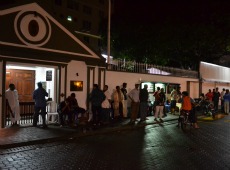Queues have started to form outside the Indian High Commission in Male’ as people seek to obtain Indian visas.
Earlier this month the Foreign Ministry decided to hand back all Indian visa application operations to the Indian High Commission following a “decline” in visa requests.
However, local media reported that Maldivians began to queue outside the High Commission building at 11:00pm on January 26 after having their visa applications rejected for various reasons.
Despite media reports, an official in the Indian High Commission denied there had been overnight queuing outside the commission building.
“Some people had come in the morning a little early so there may have been a slight queue then, but was no overnight queuing. If a problem does arise we will find a solution,” the high commission official told Minivan News.
Minivan News was awaiting a response from the Foreign Ministry at time of press.
In his address during Indian Republic Day celebrations in Male’ on Friday, Indian High Commissioner D M Mulay said India offered its assurances “that no Maldivian would ever be denied visa to India and we will work very closely with the Maldivian authorities to resolve all the outstanding issues in a spirit of cooperation and good will. ”
Last month, Maldivians were forced to queue outside the Indian High Commission – in some cases overnight – to obtain medical visas in order to travel to India.
To alleviate the issue, the Foreign Ministry launched an SMS system that alerted individuals when it was their turn to have their visas processed.
However, following a decline in visa requests this month, Maldivians wishing to obtain tokens for their Indian visas to be processed will now have to use the Indian High Commission building as before, as the Foreign Ministry is no longer providing the service.
A spokesman from the Foreign Ministry told Minivan News earlier this month that should the demand for visas increase, the ministry will take measures to ensure all visas are processed.
“If there is a requirement we will consult the Indian High Commission. It is currently issuing 53 tokens per day and we think that is working fine for now,” he said. “We will ensure that Maldivians get their visas.”
The Indian High Commission has claimed the tightened restrictions were in line with a bilateral agreement signed back in 1979 and its appropriation by Maldivian authorities in the intervening years.
A source within the Indian High Commission, speaking to Minivan News in December last year, contended that all visas given to Maldivians for travel to India were provided free of charge – a courtesy he claimed was not extended to Indian citizens coming to the Maldives for work.
The commission spokesperson added that the introduction of the tighter regulations was imposed as a clear “signal” from Indian authorities that the concerns it had over practices in the Maldives such as the confiscation of passports of migrant workers, needed to be brought to an end.
Last week, the High Commission presented journalists with a list of 11 consular grievances, including discrimination and mistreatment of its expatriates and the routine withholding of passports by government departments.



